| Srl | Item |
| 1 |
ID:
073988
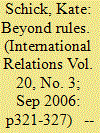

|
|
|
|
|
| Publication |
2006.
|
| Summary/Abstract |
This article critiques the liberalism that sustains human rights discourse as focused on rules to the detriment of focusing on the suffering of individuals. Too much human rights discourse has focused on the codification of human rights norms rather than the ways they are implemented and the failure to enforce them. International liberalism celebrates the advent of human rights whilst failing to confront the deeper structural dilemmas that the international political economic system generates. An engagement with critical theory leads to new ways of seeing human rights that might lead to alternative understandings of politics at the global level.
|
|
|
|
|
|
|
|
|
|
|
|
|
|
|
|
| 2 |
ID:
073986
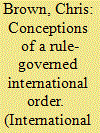

|
|
|
|
|
| Publication |
2006.
|
| Summary/Abstract |
Differences between American and European conceptions of a rule-governed international order can be observed via an examination of the legal regimes governing the conduct of American and British troops in Iraq. In principle, the US military authorities recognise the authority of international humanitarian law with respect to, for example, the treatment of prisoners and the distinction between combatants and non-combatants, but in other respects they are able to prosecute the war against the insurgency in a conventional way. British troops, on the other hand, are obliged to act in accordance with a much more restrictive legal regime, based on changes introduced subsequent to Britain's membership of the International Criminal Court. Under this regime, British military forces in Basra are subject to much the same kind of rules concerning the use of force that govern the operation of civilian police forces in Western Europe. This 'European' attempt to control the way in which force is used is widely seen as a positive move in the direction of minimising the role of force in international relations - but such a judgement is questionable since there may well be circumstances where the effective use of force is both necessary and justified.
|
|
|
|
|
|
|
|
|
|
|
|
|
|
|
|
| 3 |
ID:
073982
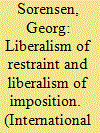

|
|
|
|
|
| Publication |
2006.
|
| Summary/Abstract |
This article seeks to evaluate the prospects for a liberal world order. Sceptical visions of renewed conflict and major terrorist threat are rejected. But this does not pave the way for a peaceful, cooperative liberal order in any simple way. Liberal progress also produces illiberal counter-reactions, and strong political forces are pursuing a liberal order with elements that are essentially illiberal. There has been much too little debate about the substantial contents of a liberal world order. The article identifies two major currents in liberalism, Restraint and Imposition. Each is problematic and a stable liberal world order will have to find a course which avoids the pitfalls of these extremes.
|
|
|
|
|
|
|
|
|
|
|
|
|
|
|
|
| 4 |
ID:
073984


|
|
|
|
|
| Publication |
2006.
|
| Summary/Abstract |
This article examines the interpretation of rules as an essential part of their meaning. It starts with some of the most foundational rules - pacta sunt servanda, for instance - and points to their contested nature. It looks at some of the causes of this inherent contestability and its effects on the international system. It concludes by noting that appeals to rules never settle a debate, but only begin the interpretative process that constitutes the international system. While this interpretative licence does not lead to complete anarchy, it does leave open a wide range of outcomes in rule-governed systems.
|
|
|
|
|
|
|
|
|
|
|
|
|
|
|
|
| 5 |
ID:
073985
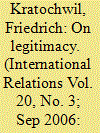

|
|
|
|
|
| Publication |
2006.
|
| Summary/Abstract |
This article provides a conceptual analysis of different uses of the term 'legitimacy'. Rather than attempting to provide a simple 'definition' I argue that the meaning of the concept cannot be understood in terms of a clear reference, but has to be analysed through its links with other concepts within a semantic field. In this way we are also able to 'explain' why at first contradictory uses of the term (designating its 'input' or the 'output' side) are part of its 'grammar'. To that extent attempts at stipulative definitions aiming at an unequivocal sense of the term fundamentally misunderstand the function of this concept within the political discourse.
|
|
|
|
|
|
|
|
|
|
|
|
|
|
|
|
| 6 |
ID:
073990


|
|
|
|
|
| Publication |
2006.
|
| Summary/Abstract |
This article confronts the problem of private authorities engaging in rule-making activities for public purposes. This form of rule-making raises questions about the justice, authority and, most importantly, legitimacy of these institutional arrangements. The private authority that creates rules in the international financial system relies on claims of efficiency and expertise. These claims focus on the rules created rather than the institutions that create them, institutions that are private and thus self-interested in a different way from public authorities. The article explores these issues through a review of the role of banks that engage in rule-making at the global level.
|
|
|
|
|
|
|
|
|
|
|
|
|
|
|
|
| 7 |
ID:
073989


|
|
|
|
|
| Publication |
2006.
|
| Summary/Abstract |
This article focuses on the United Nations' reform debates, particularly those surrounding changes to the Security Council. These debates are largely about rules, both formal and informal, that shape the roles of the veto powers and the ways in which other member-states can attain a seat on the Council. In order to implement the largely rule-governed system of collective security, it is necessary to have a Security Council that reflects a legitimate structure of authority. As the current debate demonstrates, however, the rules governing the powers of the Security Council raise numerous questions of legitimacy and authority, questions that are at the heart of a rule-governed order.
|
|
|
|
|
|
|
|
|
|
|
|
|
|
|
|
| 8 |
ID:
073983
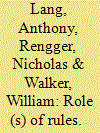

|
|
|
|
|
| Publication |
2006.
|
| Summary/Abstract |
This article explores the various roles that rules play in international relations. The article responds to the current international situation in which rules are being contested by numerous agents in a range of issue areas. While rules, by their very nature, will result in conflicting interpretations in social and political realms, these disagreements at the international level have the added danger of undermining international order. The article explores the nature of rules, focusing on moral and legal dimensions as they operate at the international level. We then turn to an exploration of debates about legitimacy, the impact of technology on rules and rule-making, and the dilemmas of enforcement. We conclude that while rules are a necessary part of any just political order, the dilemmas generated at the global level necessitate careful consideration of the very nature of rules. The responses to the article that follow this one seek to explore some of these issues and their relevance to more specific international issues.
|
|
|
|
|
|
|
|
|
|
|
|
|
|
|
|
| 9 |
ID:
073987


|
|
|
|
|
| Publication |
2006.
|
| Summary/Abstract |
This article explores the relationship between rules and politics in the intersection of the secular and the sacred. When identity in Europe was firmly fixed to Christianity, the rules governing the sacred and secular neatly meshed. With the onset of modernity, however, a cleavage arose between those two sets of rules, leading to theoretical and political conflict and confusion. Understanding the role of rules within modern religious traditions reveals the tension between symbols and authority, a conflict found in secular contexts as well. Hermeneutics, the study of interpretation which had its roots in biblical interpretation, also provides insights on rules and rule-making.
|
|
|
|
|
|
|
|
|
|
|
|
|
|
|
|